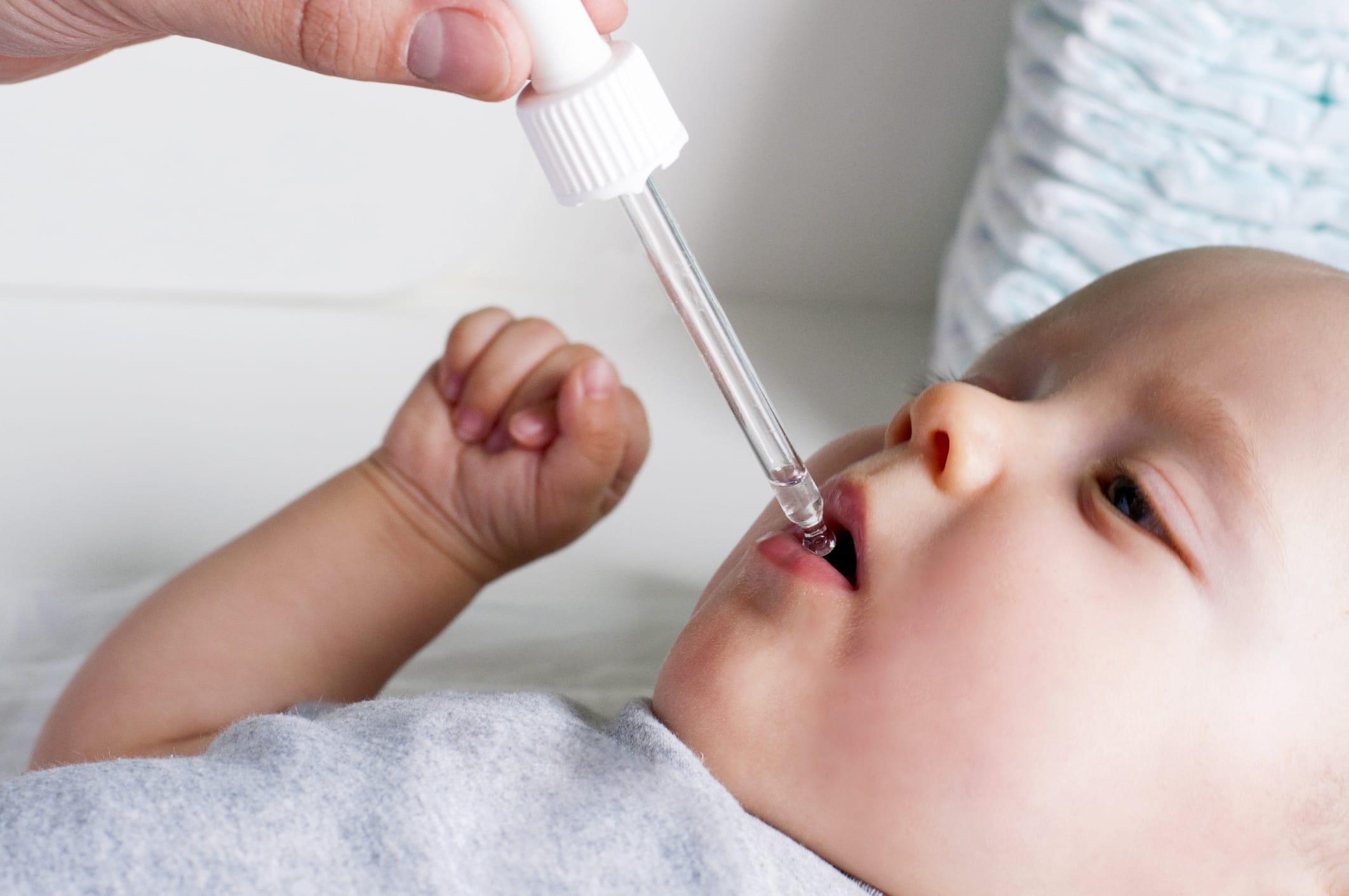[ad_1]
So what’s all the hype about vitamin D drops for babies? Isn’t breastmilk supposed to be the perfect all-encompassing source of nutrition for babies? And infant formula is made specifically for babies, so shouldn’t it already have all the vitamin D that your baby needs? Do we really have to give extra vitamin D to babies, and why?
Great questions! The American Academy of Pediatrics recommends vitamin D supplementation to prevent rickets, a rare bone disorder of childhood. Vitamin D is essential for proper bone development and growth. Without an adequate amount of vitamin D, bones lose calcium and become softer. These infants and children can develop bone deformities, pain, poor growth, bone fractures, and seizures.
The good news is that this is preventable with adequate vitamin D supplementation, hence the recommendation!
The Importance of Vitamin D
The recommended intake for vitamin D is 400 international units daily (10 micrograms) for infants. You and your baby’s body both get vitamin D from one of two ways: nutrition and/or sun exposure.
Nutrition
The problem is that vitamin D isn’t naturally found in most foods. It is found in oily fish, eggs, and fortified foods, but not in great amounts. The recommendation is that infants receive 400 international units (IU) daily. Breastmilk has an average vitamin D content of about 22 IU/L (range: 15-50 IU/L) in a vitamin D–sufficient mother. So there isn’t enough vitamin D in standard breastmilk to meet your baby’s needs.
What about the formula, though? All US formulas have 400 IU of vitamin D in one liter (about 33oz). If your baby is not yet taking that much formula, they’re not getting the recommended 400 IU daily, so check with your pediatrician about supplementing with vitamin D.
Sunlight
Our bodies get most of their vitamin D from exposure to direct sunlight. About 10-15 minutes of direct sun exposure can allow your body to make enough vitamin D. However, we know that direct sunlight dramatically increases the risk of skin cancer. So direct sun exposure is not recommended, and the AAP specifically states that infants younger than six months should be kept out of direct sunlight as much as possible.
Many factors decrease the amount of vitamin D a person can make from sunlight, including:
- Use of sunscreen
- Darker skin
- Clothing covering the skin
- High latitudes
- High levels of air pollution
So now we know that vitamin D is necessary for proper bone development. We also know that infants often do not receive enough vitamin D in breastmilk or formula alone. And we do not recommend exposing infants to direct sunlight, which is the only other way to get vitamin D into your baby’s body.
Supplementing With Vitamin D
So this is why we recommend supplementing your baby with vitamin D. There are many formulations available over the counter, so find one that works well for your family. Some supplements contain just vitamin D alone, and others combine vitamin D with probiotics or other vitamins such as iron.
When buying vitamin D for your baby, you should be looking for liquid vitamin D3 (cholecalciferol). Pay close attention to the ingredients label to know how much to give.
Some products contain 400 IU per 1ml. Although 1ml might not sound like a lot, babies have small mouths and tummies, so some families find it challenging to give that large volume directly to the baby once a day.
How to Give Vitamin D Drops
I like using the more concentrated versions containing 400 IU per one drop. You can put the drop directly in the baby’s mouth. Or you can use a small spoon. You can even put the concentrated drop on a clean pacifier or the tip of the bottle or breast for the baby to take while eating. Whichever works for your family is fine!
I usually recommend putting the vitamin D drops near your baby’s feeding supplies so that you remember to do it once a day. It doesn’t matter the time of day, just aim for once a day!
Some people want to avoid giving supplements directly to their newborn babies. There is another option for breastfeeding mothers. Instead of giving vitamin D directly to the baby, a study showed that equivalent infant vitamin D status was achieved when the lactating mother took 6400 IU per day of vitamin D supplementation. So check with your doctor if you’re interested in this!
Vitamin D Supplements are Safe and Effective
But direct vitamin D supplementation for your baby is very safe. Incidents of vitamin D toxicity are rare. An exact level of toxicity has not been established, but most cases involve ingestion of more than 10 to 100 times the recommended daily dose.
At the end of the day, we all want our babies to be healthy. Vitamin D supplementation in infancy has been proven to be safe and helps prevent vitamin D-associated rickets. The recommended intake for vitamin D is 400 international units daily for infants, beginning soon after birth.
For exclusively breastfed infants, this can be achieved through supplementing the infant directly with 400 IU of vitamin D drops once a day. Alternatively, a high maternal intake of vitamin D (4000 to 6000 IU daily) can provide adequate vitamin D for the infant if direct supplementation wants to be avoided. Infants who are formula-fed usually also require supplementation unless their formula intake is more than 33 oz daily. And remember, these are general recommendations. Always check with your baby’s doctor with any specific questions or concerns.
This article contains affiliate links. These opinions are our own. However, if you buy something, we may earn a small commission, which helps us keep our content free to our readers. Check out our Chick Picks Shop to see more of our recommended products. It’s our carefully curated shop of products we love and recommend! ❤️
[ad_2]
Original Source Link

 PARENTING TIPS
PARENTING TIPS PREGNANCY
PREGNANCY BABY CARE
BABY CARE TODDLERS
TODDLERS TEENS
TEENS HEALTH CARE
HEALTH CARE ACTIVITIES & CRAFTS
ACTIVITIES & CRAFTS


